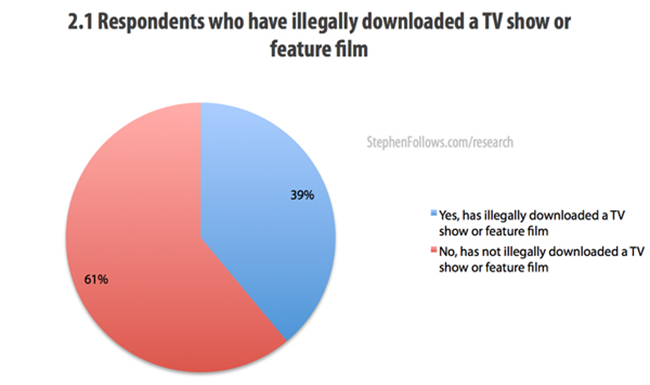Reports, research and surveys covering piracy-related issues have been released in their dozens in recent years, with many of them painting a picture of two distinct groups of people – those who illegally download and those who pay for content.
Of course, the reality is that many people who obtain content for free also cheerfully pay for content too. In fact, some studies have found that the entertainment industry’s best customers are also illegal downloaders.
But what if there was evidence to suggest that some of those pirates were actually the very people helping to create movies and TV shows? That’s one of the intriguing findings of a survey carried out by Stephen Follows, a writer and producer with a keen interest in discovering what makes the industry tick.
“Many of the decisions in the film business are based on gut, opinion and gossip so I find it fascinating to research the topics and see what the numbers say,” Follows informs TorrentFreak.
“Piracy seemed like a ready topic to research so I added a few question into a survey I ran of 1,235 film industry professionals. The respondents were all people who had been to one of the three major films markets in the past five years – Cannes, Berlin or the American film Market.”
Follows first set of questions focused on whether the film professionals felt that piracy had affected their business. The responses were then split by industry sector and budgets the professionals work to.
Considering the anti-piracy rhetoric coming out of Hollywood during the past thirty years, it’s perhaps surprising that 53% of all respondents said that piracy had either no effect or a positive effect on their business.
 Respondents were from all sectors of the industry including development, production, post-production, sales and distribution, exhibition and marketing. When the responses from each sector are broken down, one can see that respondents in sales and distribution – arguably the role that file-sharing fulfills – say they are most worried by piracy.
Respondents were from all sectors of the industry including development, production, post-production, sales and distribution, exhibition and marketing. When the responses from each sector are broken down, one can see that respondents in sales and distribution – arguably the role that file-sharing fulfills – say they are most worried by piracy.
 Turning the tables to discover how the industry professionals are themselves affecting piracy rates couldn’t be approached directly for obvious reasons, so Follows tried a different tactic.
Turning the tables to discover how the industry professionals are themselves affecting piracy rates couldn’t be approached directly for obvious reasons, so Follows tried a different tactic.
“When it came to researching how many of them actually illegally download movies I felt I needed to be a bit sneaky,” he told TF.
“To one randomly assigned set of participants I presented three statements
about the industry (such as ‘I prefer to watch films on DVD than in the cinema’). I then asked the respondent how many of the three statements they agreed with, but only asking for the combined total (i.e. ‘I agree with two of the three statements’).”
“Then, to a different randomly assigned set I offered the same three statements with the additional statement ‘I have illegally downloaded a TV show or feature film’. By subtracting the average number of agreed-with statements from the average of the control group I was able to calculate the percentage of people who agreed with the additional statement.”
 As can be seen from the diagram, 39% of the industry respondents admitted to illegally downloading video content, with 61% claiming never to have done so. Interestingly, respondents working on lower budgets were more likely to have illegally downloaded than those working on big budgets.
As can be seen from the diagram, 39% of the industry respondents admitted to illegally downloading video content, with 61% claiming never to have done so. Interestingly, respondents working on lower budgets were more likely to have illegally downloaded than those working on big budgets.
“Only 2% of people working on films over $10 million admitted to illegally downloading a film or TV show, compared with 65% of those working on films under $1 million,” Follows explains.
Also of interest is how the percentage of those who admitted illegal downloading fluctuated according to industry sector, with 55% of those in marketing saying they have grabbed movies or TV shows without paying versus zero percent in exhibition (movie theaters).
 Sales and distribution, the sector that said they’d been most affected by piracy, accounted for the next lowest piracy ‘confession’ rate of 28%.
Sales and distribution, the sector that said they’d been most affected by piracy, accounted for the next lowest piracy ‘confession’ rate of 28%.
“These are the middlemen behind the scenes of the industry who negotiate the rights between producers and cinemas/retailers. They are part of the reason why there are so many damned logos at the start of every movie,” Follows explains.
“They have the largest vested interest in stopping piracy as they don¹t have many other reasons for doing what they do (unlike filmmakers who might be wanting to create art/entertainment) and no other source of income, unlike cinemas who make a fortune on Coke/popcorn etc.”
Further reading on Stephen Follows’ research and methodology can be found hereand here. A great video he produced for Friends of the Earth can be watched on Vimeo.
(Photo: Wikimedia Commons)
This article originally appeared on Torrent Freak.
Source Article from http://intellihub.com/39-film-industry-professionals-movie-t-v-show-pirates/
Views: 0
 RSS Feed
RSS Feed

















 April 13th, 2014
April 13th, 2014  FAKE NEWS for the Zionist agenda
FAKE NEWS for the Zionist agenda  Posted in
Posted in 
















